stdClass Object
(
[id] => 20499
[title] => This Christmas between absence and new longing
[alias] => this-christmas-between-absence-and-new-longing
[introtext] => The long season of the church as imago imperi and all the trappings of worship, liturgy, power, canon law... is now over in Europe. What if this return to a pre-Christian time that celebrates the Sol invictus turns out to be the beginning of the desire for a new advent?
by Luigino Bruni
published in Città Nuova on 16/12/2025
The image, which I took in Leuven, where the only open church I came across was a museum, did not speak to me of anticipation but of absence. Together with the Magi who have already arrived in that strange nativity scene, because theirs is not a temporal distance from the Epiphany, but a metaphysical distance that cannot be bridged. They are disoriented Magi, they do not know where to go or who that child is. They no longer bring ‘gifts’ but ‘presents’, with bows and wrapping already prepared by the store, and all the same.
[fulltext] =>
That empty crib, locked behind a gate, those Magi who are absent even though they have already arrived, told me something new: truly, Christianity, Christian culture, no longer exists in Europe. In its place is Christmas (with a lowercase ‘c’), of consumption, gifts, nice feelings, reindeer and goats, discounts. These are understandable things, things that people even love, because we like celebrations.
We have returned to the second or third century, before Christianity, to the festival of light and the winter solstice (Sol invinctus). We have returned to the wars of that empire, to the categories of barbarian and foreigner, to slaves, patricians, and plebeians, to many games and little bread. And why, I asked myself, should the Baby Jesus return amid all this wickedness?
But as I pondered all this, a question came to me: “Are you sure this absence is a bad thing? What if this absence were the new name for waiting? What if it were the beginning of a new desire for a new advent?”
Historically speaking, it is absurd to ask whether the transformation of the early Christian communities into the religion of the Roman Empire and then into the Middle Ages was a good or a bad thing. It simply was. But, of course, the demands of the new religion of the empire (worship, liturgy, power, canon law...) changed something important, and that first charisma transformed into an institution left much material in the cocoon.
What is certain is that the long season of the church as imago imperi is over, at least in the West. What remains is an empty cradle, an icon of the European democratic hell. But from that emptiness, from that now-closed gate, from those bewildered Magi, from these museum-churches, something can be reborn, and perhaps is already being born: the desire for something new, the expectation of a return, everything different and everything similar to that of past centuries. We have stopped waiting for the Messiah, and his place has been taken by the wait for the Amazon package. And that is not enough.
May the empty cradle, the bewildered Magi, that iron gate be the parents of a new desire for that child. Then perhaps there is no better time than ours for a new Christmas.
May this presence-absence give rise to a new desire for infinity, for a Logos that pitches its tent among us.
[checked_out] => 0
[checked_out_time] => 0000-00-00 00:00:00
[catid] => 890
[created] => 2025-12-17 07:00:27
[created_by] => 64
[created_by_alias] => Luigino Bruni
[state] => 1
[modified] => 2025-12-23 14:13:38
[modified_by] => 64
[modified_by_name] => Antonella Ferrucci
[publish_up] => 2025-12-17 07:00:27
[publish_down] => 0000-00-00 00:00:00
[images] => {"image_intro":"","float_intro":"","image_intro_alt":"","image_intro_caption":"","image_fulltext":"","float_fulltext":"","image_fulltext_alt":"","image_fulltext_caption":""}
[urls] => {"urla":false,"urlatext":"","targeta":"","urlb":false,"urlbtext":"","targetb":"","urlc":false,"urlctext":"","targetc":""}
[attribs] => {"article_layout":"","show_title":"","link_titles":"","show_tags":"","show_intro":"","info_block_position":"","info_block_show_title":"","show_category":"","link_category":"","show_parent_category":"","link_parent_category":"","show_associations":"","show_author":"","link_author":"","show_create_date":"","show_modify_date":"","show_publish_date":"","show_item_navigation":"","show_icons":"","show_print_icon":"","show_email_icon":"","show_vote":"","show_hits":"","show_noauth":"","urls_position":"","alternative_readmore":"","article_page_title":"","show_publishing_options":"","show_article_options":"","show_urls_images_backend":"","show_urls_images_frontend":"","helix_ultimate_image":"images\/2025\/12\/16\/Nativita_Bruni_ant1.jpg","helix_ultimate_image_alt_txt":"","spfeatured_image":"images\/2025\/12\/16\/Nativita_Bruni_ant.jpg","helix_ultimate_article_format":"standard","helix_ultimate_audio":"","helix_ultimate_gallery":"","helix_ultimate_video":"","video":""}
[metadata] => {"robots":"","author":"","rights":"","xreference":""}
[metakey] =>
[metadesc] =>
[access] => 1
[hits] => 230
[xreference] =>
[featured] => 1
[language] => en-GB
[on_img_default] => 0
[readmore] => 2427
[ordering] => 0
[category_title] => EN - CN
[category_route] => economia-civile/it-editoriali-vari/it-cn
[category_access] => 1
[category_alias] => en-cn
[published] => 1
[parents_published] => 1
[lft] => 81
[author] => Luigino Bruni
[author_email] => ferrucci.anto@gmail.com
[parent_title] => IT - Editoriali vari
[parent_id] => 893
[parent_route] => economia-civile/it-editoriali-vari
[parent_alias] => it-editoriali-vari
[rating] => 0
[rating_count] => 0
[alternative_readmore] =>
[layout] =>
[params] => Joomla\Registry\Registry Object
(
[data:protected] => stdClass Object
(
[article_layout] => _:default
[show_title] => 1
[link_titles] => 1
[show_intro] => 1
[info_block_position] => 0
[info_block_show_title] => 1
[show_category] => 1
[link_category] => 1
[show_parent_category] => 1
[link_parent_category] => 1
[show_associations] => 0
[flags] => 1
[show_author] => 0
[link_author] => 0
[show_create_date] => 1
[show_modify_date] => 0
[show_publish_date] => 1
[show_item_navigation] => 1
[show_vote] => 0
[show_readmore] => 0
[show_readmore_title] => 0
[readmore_limit] => 100
[show_tags] => 1
[show_icons] => 1
[show_print_icon] => 1
[show_email_icon] => 1
[show_hits] => 0
[record_hits] => 1
[show_noauth] => 0
[urls_position] => 1
[captcha] =>
[show_publishing_options] => 1
[show_article_options] => 1
[save_history] => 1
[history_limit] => 10
[show_urls_images_frontend] => 0
[show_urls_images_backend] => 1
[targeta] => 0
[targetb] => 0
[targetc] => 0
[float_intro] => left
[float_fulltext] => left
[category_layout] => _:blog
[show_category_heading_title_text] => 0
[show_category_title] => 0
[show_description] => 0
[show_description_image] => 0
[maxLevel] => 0
[show_empty_categories] => 0
[show_no_articles] => 1
[show_subcat_desc] => 0
[show_cat_num_articles] => 0
[show_cat_tags] => 1
[show_base_description] => 1
[maxLevelcat] => -1
[show_empty_categories_cat] => 0
[show_subcat_desc_cat] => 0
[show_cat_num_articles_cat] => 0
[num_leading_articles] => 0
[num_intro_articles] => 14
[num_columns] => 2
[num_links] => 0
[multi_column_order] => 1
[show_subcategory_content] => -1
[show_pagination_limit] => 1
[filter_field] => hide
[show_headings] => 1
[list_show_date] => 0
[date_format] =>
[list_show_hits] => 1
[list_show_author] => 1
[list_show_votes] => 0
[list_show_ratings] => 0
[orderby_pri] => none
[orderby_sec] => rdate
[order_date] => published
[show_pagination] => 2
[show_pagination_results] => 1
[show_featured] => show
[show_feed_link] => 1
[feed_summary] => 0
[feed_show_readmore] => 0
[sef_advanced] => 1
[sef_ids] => 1
[custom_fields_enable] => 1
[show_page_heading] => 0
[layout_type] => blog
[menu_text] => 1
[menu_show] => 1
[secure] => 0
[helixultimatemenulayout] => {"width":600,"menualign":"right","megamenu":0,"showtitle":1,"faicon":"","customclass":"","dropdown":"right","badge":"","badge_position":"","badge_bg_color":"","badge_text_color":"","layout":[]}
[helixultimate_enable_page_title] => 1
[helixultimate_page_title_alt] => Città Nuova
[helixultimate_page_subtitle] => Civil Economy
[helixultimate_page_title_heading] => h2
[page_title] => Città Nuova
[page_description] =>
[page_rights] =>
[robots] =>
[access-view] => 1
)
[initialized:protected] => 1
[separator] => .
)
[displayDate] => 2025-12-17 07:00:27
[tags] => Joomla\CMS\Helper\TagsHelper Object
(
[tagsChanged:protected] =>
[replaceTags:protected] =>
[typeAlias] =>
[itemTags] => Array
(
)
)
[slug] => 20499:this-christmas-between-absence-and-new-longing
[parent_slug] => 893:it-editoriali-vari
[catslug] => 890:en-cn
[event] => stdClass Object
(
[afterDisplayTitle] =>
[beforeDisplayContent] =>
[afterDisplayContent] =>
)
[text] => The long season of the church as imago imperi and all the trappings of worship, liturgy, power, canon law... is now over in Europe. What if this return to a pre-Christian time that celebrates the Sol invictus turns out to be the beginning of the desire for a new advent?
by Luigino Bruni
published in Città Nuova on 16/12/2025
The image, which I took in Leuven, where the only open church I came across was a museum, did not speak to me of anticipation but of absence. Together with the Magi who have already arrived in that strange nativity scene, because theirs is not a temporal distance from the Epiphany, but a metaphysical distance that cannot be bridged. They are disoriented Magi, they do not know where to go or who that child is. They no longer bring ‘gifts’ but ‘presents’, with bows and wrapping already prepared by the store, and all the same.
[jcfields] => Array
(
)
[type] => intro
[oddeven] => item-odd
)








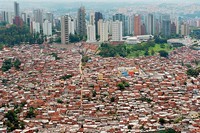 At the end of May, 2011, everyone in the EoC will meet again in Sao Paulo to rediscover the roots of this experience and outline new prospects. The EoC is alive and growing in today’s history, through the crises and the hopes of our time. Chiara Lubich’s proposal to begin businesses and industrial parks, and then (in May of 1989) to start a cultural movement that would give “scientific dignity” to the praxis of the businesses, did not fall into an empty abyss. It was embraced by thousands of people, mostly within the Focolare Movement but recently even outside of it. They are people and institutions who are trying to make that seed produce fruit.
At the end of May, 2011, everyone in the EoC will meet again in Sao Paulo to rediscover the roots of this experience and outline new prospects. The EoC is alive and growing in today’s history, through the crises and the hopes of our time. Chiara Lubich’s proposal to begin businesses and industrial parks, and then (in May of 1989) to start a cultural movement that would give “scientific dignity” to the praxis of the businesses, did not fall into an empty abyss. It was embraced by thousands of people, mostly within the Focolare Movement but recently even outside of it. They are people and institutions who are trying to make that seed produce fruit. through some of the first moments of the project. It made me remember a not very well-known episode from those days, and this memory struck me in a particular way. Chiara, returning from that trip to Brazil, had noticed a detail in a painting of Mary Desolate which was in her office and which Igino Giordani had given her many years earlier. In that painting, Mary had a crown of thorns tightly pressed to her chest. For her, it was an immediate connection with the “crown of thorns of poverty” that she had seen in the favelas of Sao Paulo and which had been the inspiration of the newly born EoC.
through some of the first moments of the project. It made me remember a not very well-known episode from those days, and this memory struck me in a particular way. Chiara, returning from that trip to Brazil, had noticed a detail in a painting of Mary Desolate which was in her office and which Igino Giordani had given her many years earlier. In that painting, Mary had a crown of thorns tightly pressed to her chest. For her, it was an immediate connection with the “crown of thorns of poverty” that she had seen in the favelas of Sao Paulo and which had been the inspiration of the newly born EoC. 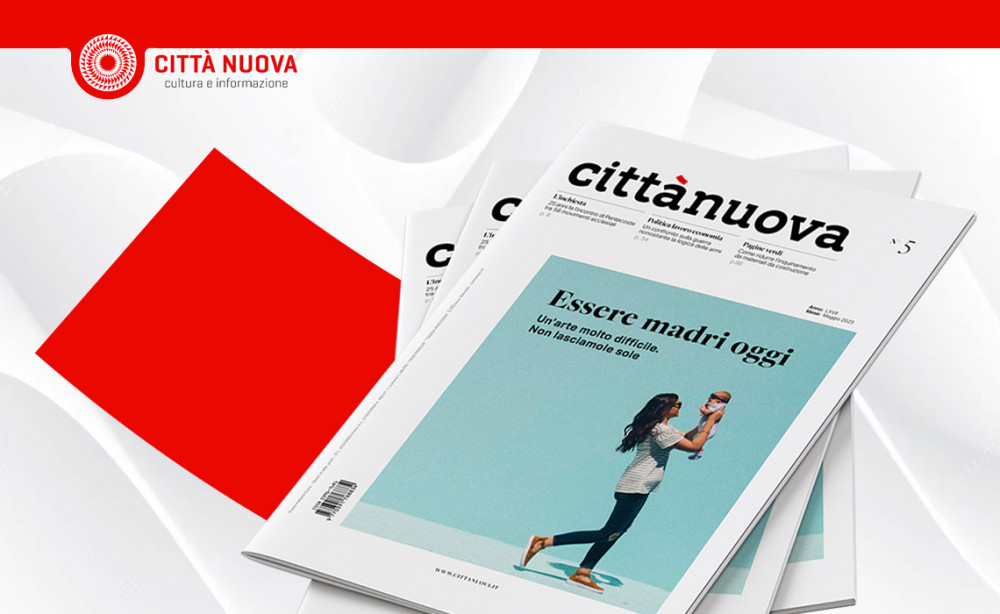
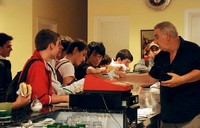 I’m invited to dinner; I bring a tray of pastries, and my host says “thanks”. I drink a coffee at the train station, and after I’ve paid a price, I say, “thanks” to the waiter. These are two thank-yous said in seemingly very different contexts: gift and friendship in the first, contract and anonymity in the second. Still, we use the same word, “thanks”. What do these two facts have in common? They are free meetings between human beings. The thank-you which we say not only to our friends but also to waiters, bakers or cashiers at the supermarket, is not only good manners or habits. That thank-you expresses recognition that, even when we’re doing nothing more than our duty, by working, there is always something more involved. Besides, we could say that work truly begins when we go beyond our duty and put all of ourselves into making lunch, tightening a screw, or giving a lesson at school.
I’m invited to dinner; I bring a tray of pastries, and my host says “thanks”. I drink a coffee at the train station, and after I’ve paid a price, I say, “thanks” to the waiter. These are two thank-yous said in seemingly very different contexts: gift and friendship in the first, contract and anonymity in the second. Still, we use the same word, “thanks”. What do these two facts have in common? They are free meetings between human beings. The thank-you which we say not only to our friends but also to waiters, bakers or cashiers at the supermarket, is not only good manners or habits. That thank-you expresses recognition that, even when we’re doing nothing more than our duty, by working, there is always something more involved. Besides, we could say that work truly begins when we go beyond our duty and put all of ourselves into making lunch, tightening a screw, or giving a lesson at school.
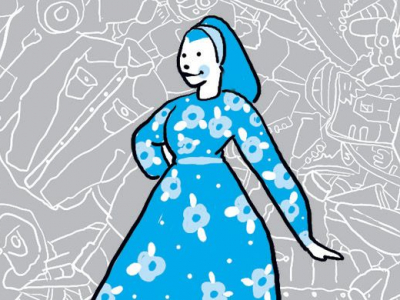
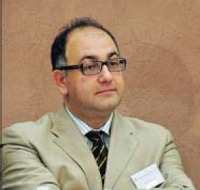 At first, the Strali had arrived at the mayor´s office in Adro (Brescia), who had decided that children whose families had not settled accounts would not be allowed to eat the school lunch. Then, when an (initially) anonymous entrepreneur paid the debt so that these faultless children would not go with an empty stomach, the author of this magnificant gesture fell under a barrage of fire. People said that it is too easy these days for someone who wants to be clever to take advantage of others´generosity. Nearly 200 families had announced that they would not pay the school tax as a sign of protest. Plus, the mayor declared to the Corriera della Sera that Silvano Lancini - the name of the entrepreneur - had made a "political act", made to favor the opposition. Whether authentic generosity or a calculated move, this episode centers on the value and role of gratuitousness in the context of citizenship. We spoke with Luigino Bruni, professor of economy at the university of Milano-Bicocca and author of a book written specifically on this topic (The Price of Gratuitousness, Cittá Nuova).
At first, the Strali had arrived at the mayor´s office in Adro (Brescia), who had decided that children whose families had not settled accounts would not be allowed to eat the school lunch. Then, when an (initially) anonymous entrepreneur paid the debt so that these faultless children would not go with an empty stomach, the author of this magnificant gesture fell under a barrage of fire. People said that it is too easy these days for someone who wants to be clever to take advantage of others´generosity. Nearly 200 families had announced that they would not pay the school tax as a sign of protest. Plus, the mayor declared to the Corriera della Sera that Silvano Lancini - the name of the entrepreneur - had made a "political act", made to favor the opposition. Whether authentic generosity or a calculated move, this episode centers on the value and role of gratuitousness in the context of citizenship. We spoke with Luigino Bruni, professor of economy at the university of Milano-Bicocca and author of a book written specifically on this topic (The Price of Gratuitousness, Cittá Nuova).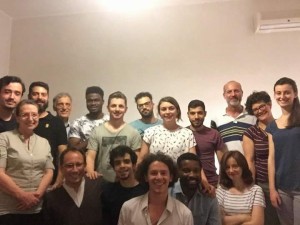 Florence, 28 June, San Lorenzo Church. In the rooms below the church, the
Florence, 28 June, San Lorenzo Church. In the rooms below the church, the  It is not easy to understand what is really happening in the growing phenomenon of the so-called sharing economy. Also because some very different experiences, sometimes too many are incorporated in this expression.
It is not easy to understand what is really happening in the growing phenomenon of the so-called sharing economy. Also because some very different experiences, sometimes too many are incorporated in this expression. In large enterprises of our day the attention paid to the management of emotions is growing quickly. Economic organizations are beginning to feel instinctively that we are in a profound anthropological transformation, and so they try, as much as they can, to find the solutions. Because of its ability to anticipate the needs and desires, capitalism is now realizing that in our time there is an ocean of loneliness, famine for attention and tenderness, lack of respect and recognition as well as desire to be seen and beloved, in an unprecedented and immense measure. And it is gearing up to meet even this 'demand' for new markets.
In large enterprises of our day the attention paid to the management of emotions is growing quickly. Economic organizations are beginning to feel instinctively that we are in a profound anthropological transformation, and so they try, as much as they can, to find the solutions. Because of its ability to anticipate the needs and desires, capitalism is now realizing that in our time there is an ocean of loneliness, famine for attention and tenderness, lack of respect and recognition as well as desire to be seen and beloved, in an unprecedented and immense measure. And it is gearing up to meet even this 'demand' for new markets.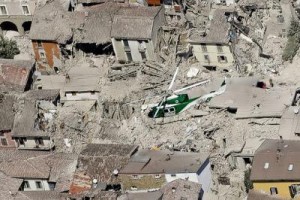 That clock tower on Amatrice church indicating 3.36 is a powerful image for what happened this night. That minute was the last minute for many victims, it will be a minute forever remembered because it is written in the flesh and hearts of their families. And it will be remembered by our country, whose recent history is also a series of clocks stopped forever by the violence of men and of the earth.
That clock tower on Amatrice church indicating 3.36 is a powerful image for what happened this night. That minute was the last minute for many victims, it will be a minute forever remembered because it is written in the flesh and hearts of their families. And it will be remembered by our country, whose recent history is also a series of clocks stopped forever by the violence of men and of the earth.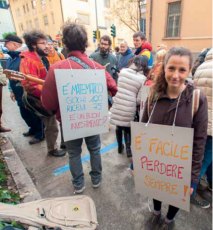 I was in London, pursuing economic studies when in the morning of 8th May 1998 Chiara Lubich reached me on my house phone. Even if I had been member of her movement since the age of 15 – this is the great adventure of my life – I had never spoken to her personally. I can still remember how moved and surprised I was, but above all I remember her words: ‘Would you like to help me to attain scientific dignity to the Economy of Communion?’ The she added that on her return from Brazil, seven years after the launch of the EoC she understood that unless there developed an economic thought to accompany the entrepreneurs, the EoC would never really take off. I said yes, I left London for Rome and started working with her and many other fellows – and it all contributed to giving a bit of that scientific dignity to the life we all wanted to live then and now. I understood that life has priority, but thoughts and theory are also life and when they are not there, practice becomes poor and short lived.
I was in London, pursuing economic studies when in the morning of 8th May 1998 Chiara Lubich reached me on my house phone. Even if I had been member of her movement since the age of 15 – this is the great adventure of my life – I had never spoken to her personally. I can still remember how moved and surprised I was, but above all I remember her words: ‘Would you like to help me to attain scientific dignity to the Economy of Communion?’ The she added that on her return from Brazil, seven years after the launch of the EoC she understood that unless there developed an economic thought to accompany the entrepreneurs, the EoC would never really take off. I said yes, I left London for Rome and started working with her and many other fellows – and it all contributed to giving a bit of that scientific dignity to the life we all wanted to live then and now. I understood that life has priority, but thoughts and theory are also life and when they are not there, practice becomes poor and short lived. Returning from Paris, from a summer school on the Economy of Communion, flying up in the sky above Europe I am thinking about our capitalism. Perhaps because in France there is a newly appointed minister of economics, perhaps because I have just greeted fifty young people who are fascinated by a more fraternal and inclusive economy. Or perhaps because my heart goes out to too many aircrafts that are in the wrong, flying over many war-ravaged lands; I cannot help thinking of our market economy, our crises, the many Africans and North Africans I've seen in the subways of Paris and its existential, economic and cultural peripheries.
Returning from Paris, from a summer school on the Economy of Communion, flying up in the sky above Europe I am thinking about our capitalism. Perhaps because in France there is a newly appointed minister of economics, perhaps because I have just greeted fifty young people who are fascinated by a more fraternal and inclusive economy. Or perhaps because my heart goes out to too many aircrafts that are in the wrong, flying over many war-ravaged lands; I cannot help thinking of our market economy, our crises, the many Africans and North Africans I've seen in the subways of Paris and its existential, economic and cultural peripheries. 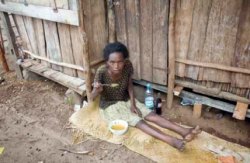 about this flight as I remember the young people from different countries of the world that I have just left, with some nostalgia.
about this flight as I remember the young people from different countries of the world that I have just left, with some nostalgia.